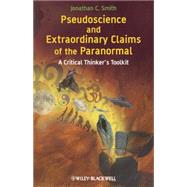
What is included with this book?
| About the Author | p. ix |
| Preface | p. xi |
| Acknowledgments | p. xix |
| Introduction | p. 1 |
| The Continuum Mysteriosum | p. 3 |
| Making Sense out of Mysteries: The Continuum Mysteriosum | p. 4 |
| Extraordinary, Nonparanormal Mysteries | p. 12 |
| An Invitation | p. 15 |
| Why Study These Things? | p. 21 |
| The Dangers of Unexamined Paranormal Claims | p. 27 |
| The Risk of Paranormal Passion and the Critical Thinker's Toolkit | p. 37 |
| Eight Reality Checks: The Critical Thinker's Toolkit | p. 39 |
| The Critical Thinker's Toolkit | p. 47 |
| Evaluate Support for a Claim | p. 49 |
| Reality Check: Are the Sources Credible? | p. 51 |
| Astrology | p. 51 |
| Questionable Sources | p. 55 |
| The Question of Authority | p. 58 |
| When Experts Get It Wrong | p. 60 |
| An Invitation to Question | p. 61 |
| Reality Check: Is the Logic Valid and Sound? | p. 71 |
| Basic Logic | p. 71 |
| Informal Logical Fallacies | p. 75 |
| Premises, Logic, and Hypothesis Testing | p. 92 |
| Reality Check: Are Claims Based on Observation (Scientific Tests and Theories)? | p. 101 |
| Observations | p. 102 |
| Tests | p. 103 |
| Theories | p. 107 |
| Sagan's Balance and the FEDS Standard | p. 112 |
| Science and Alternative Hypotheses | p. 113 |
| Consider Alternative Explanations | p. 119 |
| Reality Checking for Oddities of Nature and the World of Numbers | p. 121 |
| Probability Estimates and Bias | p. 122 |
| Math Ignorance | p. 123 |
| Coincidences | p. 125 |
| The Clumpiness of Randomness | p. 127 |
| The Law of Very Large Numbers | p. 128 |
| Science and Chance | p. 133 |
| Summary: Psychic Bias | p. 135 |
| Reality Checking for Perceptual Error and Trickery | p. 141 |
| Top-Down Processes and Perception | p. 142 |
| Manipulations of Magicians and Psychics: The Cold Reading Toolkit | p. 148 |
| Hypnotic Suggestion Enhancers | p. 157 |
| Perceptual Bias in the Mental Health Professions | p. 159 |
| Reality Checking for Memory Errors | p. 167 |
| Memory Myths | p. 167 |
| What Is Memory? | p. 168 |
| Memory Errors | p. 170 |
| Deja vu | p. 176 |
| The Deja vu Reality Check | p. 179 |
| Reality Checking for the Placebo Effect | p. 183 |
| What are Placebos? | p. 184 |
| Weak and Strong Placebos | p. 186 |
| How Placebos Work | p. 187 |
| Placebos and Superstitious Beliefs | p. 195 |
| Placebo Controversies | p. 196 |
| Placebos and Performance | p. 200 |
| Reality Checking for Sensory Anomalies and Hallucinations | p. 203 |
| Sensory Phenomena | p. 203 |
| Migraines | p. 205 |
| Tunnel Experiences | p. 206 |
| Hallucinations | p. 208 |
| Hallucinations and the Critical Thinker's Toolkit | p. 219 |
| Dissociation and the Paranormal | p. 224 |
| The Paranormal Files | p. 225 |
| Spiritualism and the Survival Hypothesis | p. 227 |
| Spiritualism | p. 227 |
| Research on Life after Death | p. 233 |
| Research on Channeling and Mediums | p. 238 |
| Conclusion | p. 241 |
| Parapsychology | p. 245 |
| The Language of Parapsychology | p. 245 |
| Research on Psi | p. 247 |
| Conclusion: The State of Psi Research | p. 261 |
| Energy Treatments and Complementary and Alternative Medicine (CAM) | p. 269 |
| Contemporary Views of Energy: The Scientific Perspective | p. 269 |
| Concepts of Energy in Children and Western History: Vitalism | p. 271 |
| Chinese History and Energy: The Yin-Yang School | p. 271 |
| Chinese Energy Treatments | p. 273 |
| Western Energy Treatments | p. 276 |
| Conclusion | p. 282 |
| Supernatural Cures and Faith Healing | p. 285 |
| The Varieties of Healing Experience | p. 285 |
| The Evidence | p. 292 |
| Conclusion | p. 299 |
| Creationism, Intelligent Design, and God | p. 303 |
| The Great Debate | p. 303 |
| Things Great and Small | p. 309 |
| The Reality Checkup: Using Your Toolkit | p. 319 |
| The Reality Checkup | p. 320 |
| How to Carry on a Civilized Discussion about the Paranormal | p. 329 |
| Parting Words: Pandora's Challenge | p. 330 |
| Complementary and Alternative Medicine | p. 341 |
| Critical Thinking and Paranormal Resources | p. 345 |
| Susan Blackmore on Paranormal Research | p. 353 |
| Notes | p. 357 |
| References | p. 365 |
| Name Index | p. 395 |
| Subject Index | p. 403 |
| Table of Contents provided by Ingram. All Rights Reserved. |
The New copy of this book will include any supplemental materials advertised. Please check the title of the book to determine if it should include any access cards, study guides, lab manuals, CDs, etc.
The Used, Rental and eBook copies of this book are not guaranteed to include any supplemental materials. Typically, only the book itself is included. This is true even if the title states it includes any access cards, study guides, lab manuals, CDs, etc.